How Americans view the internet’s impact on groups
When asked to assess the impact of the internet on the ability of social, civic, professional, religious or spiritual groups to engage in a number of activities, Americans express generally positive views. Nearly seven in ten (68%) believe that the internet has a “major impact” on the ability of groups to communicate with their members, and roughly six in ten feel that the internet has a “major impact” on the ability of groups to draw attention to issues (62%), connect with other groups (60%), impact society at large (59%), and raise money (52%). For each of the nine group-based activities we measured in this survey, three-quarters of Americans or more feel that the internet has had at least some impact (if only a minor one) on the activity in question.
“Finding people to take leadership roles” is the activity for which the internet is viewed as having the smallest impact—35% of Americans feel that the internet has a “major impact” on this aspect of group dynamics, a figure that is notably smaller than the other group impacts we evaluated.
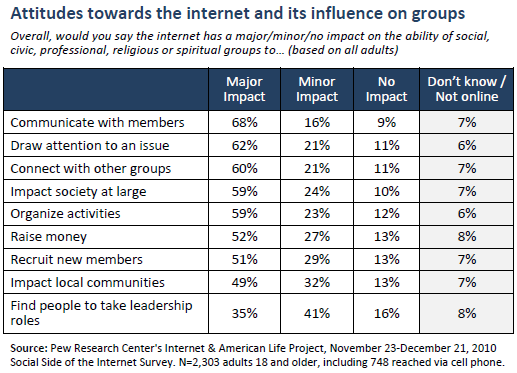
Demographically, college graduates have particularly positive attitudes regarding the internet’s impact on groups—they are significantly more likely than non-college graduates to say that the internet has a “major impact” on the ability of groups to communicate with members, draw attention to issues, impact society at large, organize activities, and raise money. Younger Americans are also more likely than their elders to view the internet as having a “major impact” on groups. In particular, 18-29 year olds are significantly more likely than those in other age groups to feel that the internet has a “major impact” on groups’ ability to recruit new members (64% feel that the internet has a major impact in this regard) and find people to take leadership roles (44% cite this as a major impact of the internet on groups).
These questions were asked of all adults (regardless of whether or not they go online), and it is instructive to compare the attitudes of those who go online and those who are not internet users. Across nearly all of the categories we measured, Americans with experience using the internet are significantly more likely to say that the internet has a “major impact” on group structure and behaviors compared with those who do not go online.
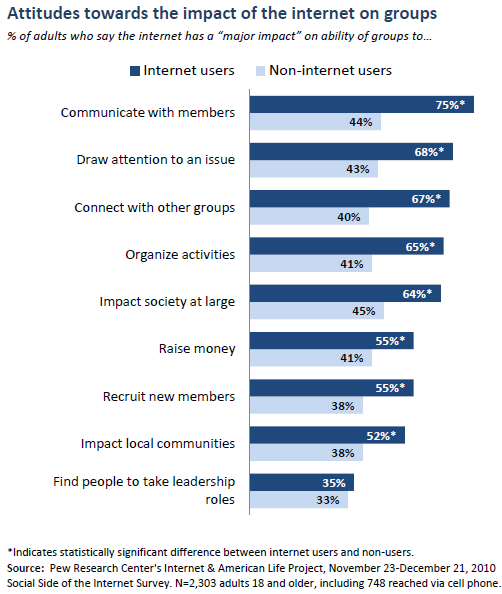
How the internet impacts group members’ ability to keep up and be involved with the groups they belong to
In addition to asking how the internet impacts groups in a general sense, we also asked active group members about the ways in which the internet has or has not impacted their own ability to take part in group activities. Overall, these group members feel that the internet has had the greatest impact on their ability to keep up with news and information from the groups they belong to. Among group members who go online, 53% say that the internet has had a “major impact” on their ability to keep up with group news, and an additional 30% say it has had a “minor impact” in this regard. Just 17% feel that the internet has had no impact one way or another on their ability to keep up with group news.
On the other end of the spectrum, these group members tend to feel that the internet has had a relatively modest impact on their ability to contribute their time or money to the groups they belong to, or to create groups of their own. Roughly three-quarters of group members believe that the internet has had either a “minor impact” or “no impact” on these aspects of their participation in groups.
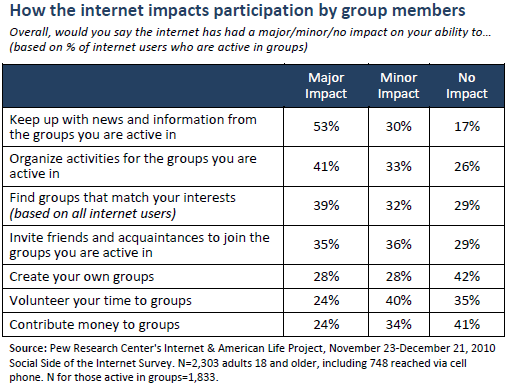
Notably, users of social networking sites and the status update service Twitter are significantly more likely than other group participants who go online for group activities, to say that the internet has a “major impact” on their ability to engage with their groups.
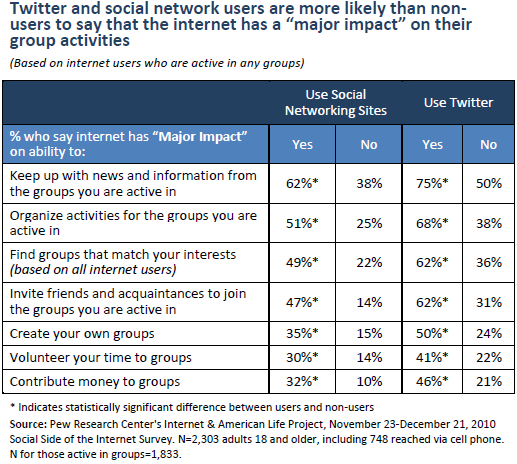
How the internet impacts group discovery and time spent with groups
Although group members (and the public at large) feel that the internet has generally contributed in a positive way to group communication and dynamics, they are somewhat more measured in assessing the impact of the internet on helping them find out about new groups and spend more time with the groups they currently belong to.
While some active group members discovered their groups online, a majority of these group discoveries occur offline.
Among active group members who also use the internet, one-quarter (24%) say that they discovered at least some of the groups they belong to on the internet, and most likely would not have known about them were it not for online tools. Still, three times that number of active group members (75%) did not discover any of the groups they belong to online.
Demographically, discovering groups online is most prevalent among those younger than 50. One third (34%) of internet-using group members ages 18-29 and 27% of those ages 30-49 have discovered groups on the internet, compared with 18% of such members ages 50-64 and 13% of those ages 65 and up. More than eight in ten group members over the age of 50 (83%) say that none of their groups were discovered online.
Around half of group members who go online participate in a greater total number of groups thanks to the internet
A total of 46% of internet users who are active in one or more groups say that the internet has helped them be active in “a lot” (26%) or “a few” (20%) more groups than they would otherwise. The remaining 53% of these group members say that the internet has had no impact one way or another on the number of groups they take part in.
As with discovering groups, young adults (in particular those ages 18-29) are more likely than older group members to say that they participate in more groups thanks to the internet. Among group members who also go online, fully 39% of 18-29 year olds say that the internet has caused them to take part in “a lot” more groups than they otherwise would; this compares with 27% of such 30-49 year olds, 20% of 50-64 year olds and 12% of those ages 65 and older. Additionally, African-American (37%) and Latino (41%) group members are significantly more likely than white group members (22%) to say that they participate in “a lot” more groups because of the internet.
Seven in ten internet users say that technology has not impacted the amount of time they spend on group activities
Overall, seven in ten internet users (70%) say that the internet has had no impact on how much time they spend participating in group activities. However, those online adults who say that the internet has impacted their “group time” are more likely to say it has done so in a positive direction than in a negative one—23% of internet users say they spend more time participating in group activities thanks to the internet, while just 6% say that the internet causes them to spend less time on these activities. Those under the age of 50, as well as the well-off and well-educated, are particularly likely to say that they spend more time on group activities because of the internet.
Social media use is correlated with higher rates of online group discovery and engagement
Users of Twitter and social networking sites stand out dramatically from other group members when it comes to their attitudes towards the impact of technology on their own group behaviors. Compared with group members who go online but do not use these services, Twitter and social networking site users are significantly more likely to say that they discovered some of their groups online, that the internet helps them participate in a greater number of groups, and that they spend more time participating in group activities thanks to the internet.
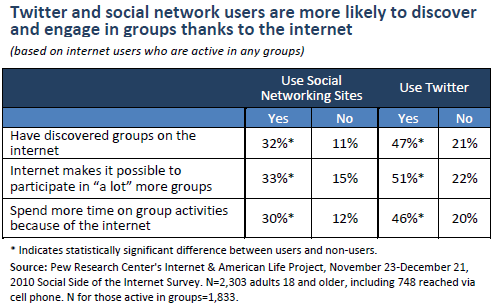
The role of the internet in achieving group objectives
To evaluate the role of the internet in helping groups achieve relevant objectives and outcomes, we first asked all active group members whether or not any of the groups that they participated in had accomplished certain outcomes in the preceding twelve months; for those that had achieved those outcomes, we then asked what role the internet played (if any) in achieving those goals. The active group members in our survey reported that their groups accomplished the following objectives in the twelve months preceding our survey:
- 55% of active group members say they were in a group that provided emotional support to someone in need; 32% of active group members say that the internet played a role in accomplishing this goal
- 51% of active group members say they were in a group that provided financial support to someone in need; 29% of active group members say the internet played a role in accomplishing this goal
- 50% of active group members say they were in a group that raised money for a specific cause; 34% of active group members say the internet played a role in accomplishing this goal
- 48% of active group members say they were in a group that raised awareness about an important social issue; 39% of active group members say the internet played a role in accomplishing this goal
- 34% were in a group that solved a difficult problem or achieved change in their local community; 22% of active group members say the internet played a role in accomplishing this goal
- 27% of active group members say they were in a group that solved a difficult problem or achieved change in society at large; 20% of active group members say the internet played a role in accomplishing this goal
- 17% of active group members say they were in a group that got a candidate elected to public office; 14% of active group members say the internet played a role in accomplishing this goal
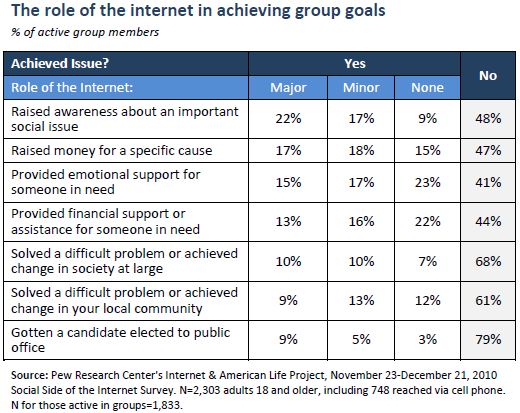
Clearly, not all of these group objectives were accomplished equally frequently (for example, respondents were twice as likely to be part of a group that provided emotional assistance to someone in need as they were to be part of a group that got a candidate elected to public office). In order to provide an apples-to-apples comparison of the relative importance of the internet in helping to achieve these objectives, we can filter out those groups which did not achieve each individual objective in the preceding twelve months and compare only those groups who were successful in doing so.
When we conduct this side-by-side analysis of “successful” groups, the internet stands out as especially relevant to electing candidates to public office (fully 53% of those who are part of a group that did this say that the internet played a “major role” in doing so) and raising awareness about issues (46% of those who are part of a successful awareness-raising group cite the internet as playing a “major role” in this effort). The internet also plays a relatively important role within groups that successfully address larger societal issues or raise money for a cause.
In contrast, groups that solved a local problem or issue, and those that provided emotional or financial support to someone in need, were comparatively less reliant on the internet to achieve these goals. Members of groups that successfully accomplished these objectives were more likely to say that the internet played no role in their success than they were to say that the internet played a “major role”.
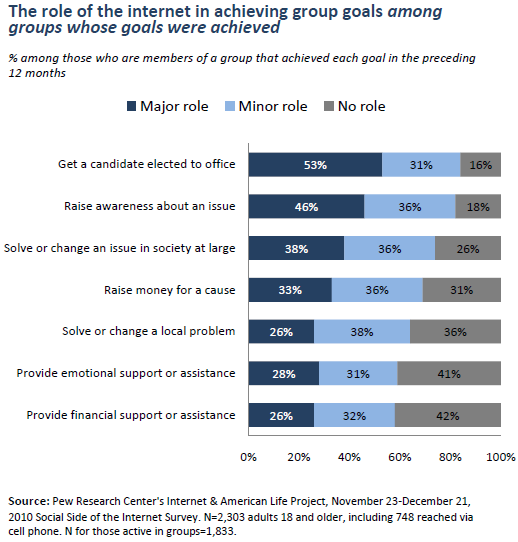
The power of the internet and social media for group engagement
It is hard to underestimate the impact of social media and internet use on group engagement. As noted in several places in this section, social network site users and Twitter users are much more likely than online group members who do not use these tools to say that the internet has a major impact on almost all aspects of their group engagement. This relationship is confirmed in regression analyses when other important factors such as age, education, income, personal efficacy, religiosity, and trust are controlled.
In fact, among all of these key predictors of online behavior and group involvement, being a daily internet user, being a social network site user, and being a Twitter user are among the most powerful predictors of whether people perceive the internet as having a major impact on their ability to find groups that match their interests, bring others into their groups, keep up with the groups they belong to, organize group activities, contribute money or volunteer their time, and even create their own groups. Moreover, among active group participants who are online, social network site use, Twitter use, and daily internet use are more powerful predictors of discovering new groups online, participating in “a lot more groups,” and spending more time participating in groups than other factors such as age, income, education, and efficacy.


